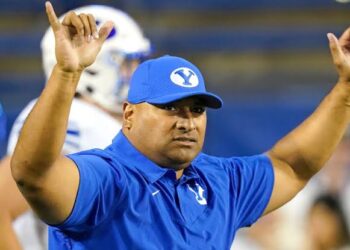JUST IN: LSU FOOTBALL COACH BRIAN KEITH KELLY RECENTLY ANNOUNCED A DEVASTATING DEAL, WHICH FORBIDS PLAYERS FROM CERTAIN NIL ACTIVITIES
BATON ROUGE, LA — In a stunning and controversial move that has already sparked national debate, LSU Tigers head football coach Brian Kelly has announced a new internal policy that forbids players on the team from engaging in specific Name, Image, and Likeness (NIL) activities, effective immediately. The decision, which Kelly described as “necessary to preserve team unity and competitive focus,” comes at a critical time when college athletics continues to grapple with the evolving landscape of athlete compensation.
The announcement, made during a press conference at LSU’s football headquarters on Friday morning, details a set of restrictions that prohibit players from entering NIL deals that, according to Kelly, “conflict with LSU’s brand values, disrupt the locker room dynamic, or prioritize personal gain over team success.” The decision is being labeled by some analysts as “devastating” for student-athletes seeking to capitalize on their personal brand during their college careers.
A DIVIDING LINE
Coach Kelly, now entering his fourth season at the helm of LSU football, defended the new policy as a step toward maintaining team cohesion.
“This isn’t about taking away opportunity,” Kelly stated. “It’s about protecting our team culture. When NIL becomes more about individual branding than team success, we have a problem. We’ve had cases where off-field distractions from NIL commitments interfered with practice schedules, film sessions, and even game preparation.”
According to the policy, LSU players are now forbidden from signing NIL agreements that:
Promote alcohol, gambling, tobacco, or other “morally conflicting industries”
Involve social media obligations during team hours or game weeks
Prioritize individual sponsorship appearances over team events
Require personal media commitments during the season without clearance
Violations of these new terms may result in suspension from team activities or even loss of playing time.
BACKLASH FROM PLAYERS AND FAMILIES
The response from current and former players has been swift and vocal. Several athletes, speaking anonymously to local media outlets, expressed frustration that the policy limits their financial opportunities—particularly those who do not anticipate NFL careers.
“I’ve got one shot to make something of my name while I’m here,” one junior linebacker said. “Most of us aren’t going pro. NIL was finally a way to help our families and secure our futures. Now we’re being told to back off?”
Parents of players are also expressing concern. One parent of an LSU wide receiver said, “This isn’t the 1980s. These kids deserve to profit like everyone else in college sports. Why is the coach allowed to block that?”
A LEGAL AND ETHICAL GRAY AREA
Legal experts are already weighing in on the potential implications of LSU’s move. NIL rules, governed largely at the state and institutional level, vary across the country. In Louisiana, legislation allows schools to impose “reasonable restrictions” on NIL deals that conflict with educational values—but there is no clear definition of what constitutes “reasonable.”
Sports law analyst Danielle Graham says the move could be challenged if players feel their rights are being infringed.
“While schools have some discretion, blanket policies that appear to curtail legitimate earning potential could open the door to legal scrutiny, especially if players are being punished for non-disruptive activities,” she said.
The NCAA, which has largely taken a hands-off approach to NIL enforcement, has yet to comment on the LSU announcement.
RECRUITING IMPACT?
Perhaps the most immediate concern for LSU fans and alumni is how the policy could affect recruiting. LSU, known for its powerhouse football program and NFL pipeline, has been a top destination for elite talent. But in today’s NIL-driven era, recruits are often influenced as much by financial opportunity as by athletic tradition.
Rivals.com recruiting analyst Jordan Tyler says LSU may feel the sting.
“There’s no way around it—this will hurt. Top prospects are looking for schools that offer freedom and opportunity. If LSU is seen as restrictive, they’ll lose ground to places like Texas, USC, and Alabama, where NIL is wide open,” he said.
Still, some believe the move could actually appeal to recruits and families who prioritize structure and development over quick financial gaining
Kelly insisted the decision was not made lightly and emphasized that players can still engage in many NIL deals, so long as they align with LSU’s new standards.
“We’re not anti-NIL,” he said. “We just want NIL to serve the right purpose—for players, for this program, and for the game itself.”
LSU athletic director Scott Woodward offered support for Kelly’s stance, saying in a statement: “Coach Kelly has the full support of this administration. His commitment to discipline, focus, and long-term success is exactly what LSU football stands for.”
As the college football world reacts, all eyes will be on LSU to see how the policy plays out—and whether other programs follow suit or resist










